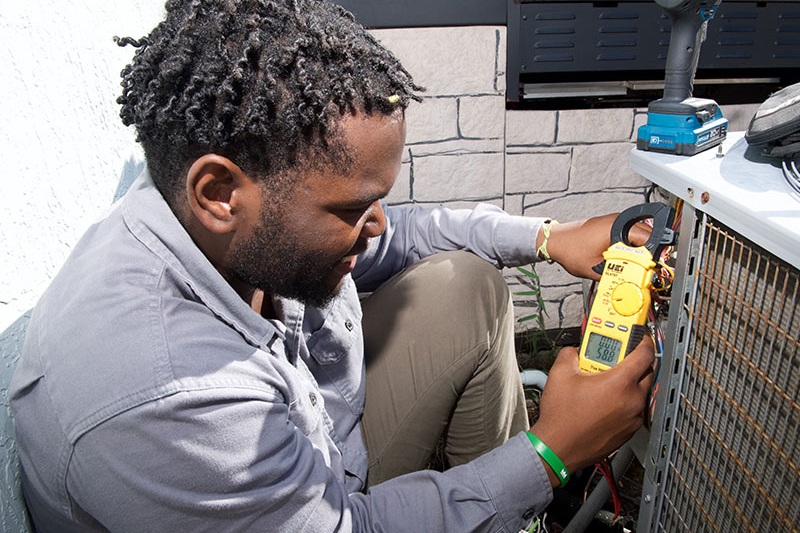TWS is a Great Training Option for Everyone
Learn more about how we can prepare you to advance your career.
Did you know that the sunlight hitting the earth’s surface in an hour and a half is enough to supply the world’s energy consumption for a year?1 Solar energy can reduce the cost of electricity and contribute to gaps in energy from the electrical grid. Solar energy can be found on house rooftops or in large solar arrays with mirrors that concentrate the sun. So, how does solar work?
How Does Solar Work?
Solar panels convert sunlight into energy that can power everything from home lights to electric cars. Solar radiation is emitted by the sun. Solar panels capture this radiation and turn it into energy. Solar panels are made of silicon in the form of semiconductors. Silicon creates solar cells and converts sunlight into electricity. There are two types of standard solar panels:
Photovoltaic Panels – the sun shines on the PV panel and creates energy. The energy creates an electrical charge, causing the electricity to flow.
Concentrating Solar-Thermal Power – uses mirrors to reflect sunlight and collect solar energy, converting it to heat. The heat can then power a turbine to create energy.
Have You Considered a Career in the Skilled Trades?
Fill out the form to recieve a no obligation info packet.
Solar panels can’t store energy but can be paired with solar batteries. These batteries can keep surplus energy for times of need, like power outages or to charge an electric vehicle.
What is the Photovoltaic Effect2?
When sunlight hits a photovoltaic panel, it dislodges electrons from their atoms. This generates a flow of electricity. This is achieved through two different types of silicon in the solar cell: one is positively charged, and the other is negatively charged. Electrons are driven towards the conductive metal plates, creating an electrical circuit. When the electrons flow through this circuit, electricity is produced.
What are the Benefits of Solar Power?
There are many benefits of solar power. These benefits include:
Clean, Renewable Sources of Energy
The world is reliant on fossil fuels. Wars are fought for fossil fuels. That is why clean, renewable sources of energy are so important. The sun supplies enough energy in one and a half hours for the world to run for a year. There is also wind energy, geothermal, hydropower, and bioenergy, to name a few. We have options to reduce our reliance on fossil fuels.
Reduction in Greenhouse Gas Emissions
The United Nations (UN) has targeted reducing our dependence on fossil fuels as one of the most critical modern crises. The Paris Agreement3 was ratified by 190 countries in 2021 to increase our commitment to climate change and reduce the global average temperature below 1.5 degrees Celsius.
Lower Electricity Bills
Did you know that you can lower your electricity bill using solar panels? Fossil fuel electricity costs between 5 and 17 cents per kilowatt-hour. Solar energy, on the other hand, only costs 3 to 6 cents per kilowatt-hour4. Using solar can help save money in the long run.
Increased Energy Independence
Next time the power goes out, you can leave the candles in the drawer. With a solar panel system and solar battery, you can keep the lights on during a power outage. Plus, if you are in Houston or Dallas, you won’t have to worry about price increases in the summer and winter weather affecting your energy consumption. Just set up a solar panel system and enjoy the benefits.
Low Maintenance Costs
The initial cost can be financed and offset by financial incentives offered by your state government. Once installed, you just need to clean the solar panels, so they work efficiently. The maintenance cost is about $150 annually, including an annual inspection5.
Financial Incentives to Offset Installation Costs
Some states offer incentives to install and set up a solar energy system. The federal government also provides Federal tax credits for solar photovoltaics6. When you purchase a PV system, you can claim a percentage of the cost of your federal income tax. In 2021, PV systems were eligible for a 26% tax credit.
Want to Learn More?
The Electrical Applications program at TWS trains students in hands-on courses guided by expert instructors for one purpose: to prepare them for job opportunities as entry-level electricians. This in-depth program teaches students mechanical and electrical principles, residential and commercial wiring fundamentals, and more. This program is offered at our Jacksonville, FL, Tulsa, OK, and Houston, TX campuses. Contact us at (855) 981-7313 to learn more about our Electrical Applications program.
- https://www.energy.gov/eere/solar/how-does-solar-work
- https://www.evoenergy.co.uk/news-updates/how-do-solar-panels-work-2/
- https://unfccc.int/process-and-meetings/the-paris-agreement
- https://www.consumeraffairs.com/solar-energy/solar-vs-fossil-fuels.html
- https://www.forbes.com/home-improvement/solar/solar-panel-maintenance-tips/
- https://www.energy.gov/eere/solar/homeowners-guide-federal-tax-credit-solar-photovoltaics







